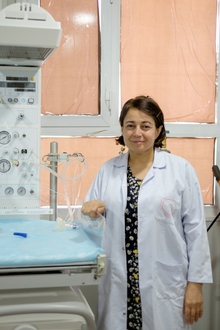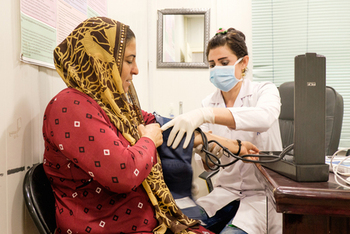Health in focus: improving care in times of crisis
Project description
Title: Improvement of health care for internally displaced persons, refugees and the local people in Dohuk Province in Northern Iraq
Commissioned by: German Federal Ministry for Economic Cooperation and Development (BMZ)
Country: Iraq
Lead executing agency: Ministry of Planning of the Kurdistan Regional Government
Overall term: 2016 to 2021
+++ In the context of the corona pandemic, this project was extended to include measures that help to counteract the spread of the virus and mitigate its effects. +++

Context
Since the outbreak of the Syrian crisis and the advance of so-called Islamic state, around one million internally displaced people (IDPs) and 250,000 Syrians have sought refuge in the autonomous region of Kurdistan in northern Iraq. The large number of IDPs and refugees has put an enormous strain on the health system. In addition, many people are traumatised by their experiences. On their own, Kurdish authorities are unable to provide medical and psychosocial care for the substantial number of people affected.
Objective
IDPs, refugees and the population in the host communities in Dohuk Province receive better medical and psychosocial care.
Approach
In cooperation with the local authorities, the project is working to improve health care for IDPs, refugees and residents in the host communities.
As part of a previous project, six primary health care (PHC) centres were constructed and equipped in various camps in 2015, and two hospitals were extensively renovated. The range of services is now being expanded through additional construction measures in the areas of obstetrics and emergency medicine, the provision of medical equipment, and training for medical and technical staff. Four of the PHC centres in the camps were initially run by non-governmental organisations, but the responsible health administration is now managing them. Many of the PHC centre employees and medical staff were recruited from the IDPs and refugees in the camps. The centres provide free basic medical care to both camp residents and the surrounding communities.
To improve emergency treatment for a greater number of patients, the project is expanding emergency care at Azadi Teaching Hospital in Dohuk. This is opening up additional care and treatment options. The project is also providing medical equipment.
This means that emergency patients will receive better care in the future. One focus will be on treating special emergencies such as polytrauma and acute cardiovascular disease.
Needs analyses are being used to identify areas in which medical and technical staff require training and to run appropriate courses. There is also a focus on training hospital managers and psychosocial care specialists. To this end, the project cooperates with hospitals from Europe and the region that have this expertise.
In order to keep the effects of the corona pandemic in northern Iraq under control, training courses on the prevention and care of Covid19 patients will be extended at short notice. Together with the Italian non-governmental organisation AISPO and the Directorate of Health, more than 1,700 doctors, nurses and other hospital staff in the governorate of Duhok/Northern Iraq had received comprehensive training in the professional handling of the SARS-CoV-2 infection by the end of April.

Results
- Basic medical care has been secured temporarily for about 50,000 IDPs. Financial support was given to three PHC centres in various camps. The centres are being managed by the partner organisations MEDAIR and International Medical Corps (IMC).
- A further 10,000 IDPs and refugees have received temporary basic medical care. To this end, the project contracted the Kurdish non-governmental organisation Heevie to run another PHC centre in January 2017.
- A maternity ward has been set up in Kabarto Camp. It opened in mid-2016.
- The project supported the health administration for several years. This ensured that medical care was available in the camps until early 2019. The central government in Baghdad has been responsible for funding the health centres since resuming its financial support programme.
- Numerous specialists from the health authority and employees from the hospital administration attended a four-month training course in health care management.
- In addition, training courses have been held to improve the health system in other areas. Topics included health financing and maintenance management.